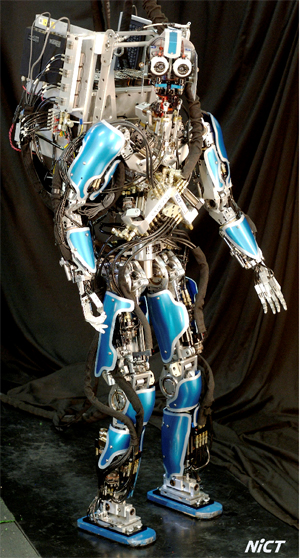 On November 21, a group of small- to medium-sized venture companies based in western Japan unveiled an autonomous ladybug-shaped robot designed to clean public restrooms at highway rest areas.
On November 21, a group of small- to medium-sized venture companies based in western Japan unveiled an autonomous ladybug-shaped robot designed to clean public restrooms at highway rest areas.
The 1-meter (39-inch) tall, 1.35-meter (53-inch) long prototype robot -- named "LadyBird" -- is equipped with water tanks, brushes and other tools needed for heavy-duty scrubbing. Obstacle detection sensors allow the robot to safely perform its duties without running into people.
In addition to cleaning, LadyBird can engage in simple conversation with restroom users, thanks to microphones in its "antennae," speech recognition capabilities and a voice synthesizer. The robot has access to the latest information about traffic conditions on nearby roads, which it can relay to anyone comfortable enough to ask.
The developers, who are building LadyBird for West Nippon Expressway Company Limited (NEXCO), aim to complete the machine by March 2009, and they hope to one day see it cleaning toilets at hotels and other institutions. Lady Bird robots are expected to sell for about 3.5 million yen ($30,000) each.
[Source: Yomiuri]

 On November 7, lingerie maker Triumph International Japan unveiled the "My Chopsticks Bra," which features a pair of cups that resemble bowls of rice and miso soup, and a set of collapsible chopsticks that tuck into either side. The My Chopsticks Bra is the latest addition to Triumph's line of concept lingerie designed to boost awareness of environmental issues.
On November 7, lingerie maker Triumph International Japan unveiled the "My Chopsticks Bra," which features a pair of cups that resemble bowls of rice and miso soup, and a set of collapsible chopsticks that tuck into either side. The My Chopsticks Bra is the latest addition to Triumph's line of concept lingerie designed to boost awareness of environmental issues. 

 As Japan's population continues to age and shrink, more and more people are looking at robots as a way to improve productivity and support the nation's changing lifestyles. With human-robot interactions on the rise, and with the recognition that much of human communication is nonverbal, researchers at Japan's National Institute of Information and Communications Technology (
As Japan's population continues to age and shrink, more and more people are looking at robots as a way to improve productivity and support the nation's changing lifestyles. With human-robot interactions on the rise, and with the recognition that much of human communication is nonverbal, researchers at Japan's National Institute of Information and Communications Technology (




